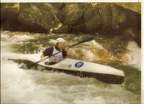- Posts: 82
- Thank you received: 2
Upwind is a Heavy or Light boat best?
- Kneewall49
-
 Topic Author
Topic Author
- Offline
- Premium Member
Two boats identical except for layup, lets say a V10 Sport double; one carbon layup and the other a vacuum glass layup.
Same paddlers in both, same conditions, ie smashing into a short head wind 1-2 foot chop (in protected waters, ie no swell).
Is one boat going to be faster, or easier, to hold at a set speed than the other?
Scientific evidence preferred over assumptions or opinions.
(no comments from you BD!)
Northern Beaches, Australia.
[Fenn Swordfish, Fenn Spark, Carbonology Zest Double
Pain is temporary, glory can be even less so...
Please Log in or Create an account to join the conversation.
- Posts: 177
- Thank you received: 23
Please Log in or Create an account to join the conversation.
- Kneewall49
-
 Topic Author
Topic Author
- Offline
- Premium Member
- Posts: 82
- Thank you received: 2
If so that would be less of an issue with lighter paddlers than heavy ones?
We are both around 70kg each. Small fry.
Northern Beaches, Australia.
[Fenn Swordfish, Fenn Spark, Carbonology Zest Double
Pain is temporary, glory can be even less so...
Please Log in or Create an account to join the conversation.
Life truly lived is full of risk; to fence out risk is to fence out life itself
Please Log in or Create an account to join the conversation.
- [email protected]
-

- Offline
- Admin
- Posts: 1838
- Thank you received: 411
if EVERYTHING else is equal
Part of what I love about surfski paddling is that the complexities of of ski design and conditions mean that there's a large measure of magic that comes into play along with science.
For example... some people feel that stiffer skis are better; flexible skis "leak energy" as they bend over the waves.
Sounds like sense to me. But a couple of years ago we had the opportunity to try two different versions of the Red7 Surf70 Pro: a "heavy" but stiff carbon boat and a "light", flexible cork composite boat. They were identical in everything - including weight - except for the flexibility. We took them out into choppy water in Hout Bay and we both found that (as mid-packer paddlers) we were faster in the cork boat. The reason was nothing to do with the flexibility but rather that we both found the stiff carbon boat much more tippy. We theorised that the cork boat's flexibility meant that the centre section sat lower in the water and it was hence more stable.
Similarly, in my opinion, a heavy boat can be easier to paddle upwind, because it doesn't get thrown around as much by the wind - especially if there are waves and you're ramping them, exposing the ski's nose to the gusts. Paddling out to the start of our Millers Run downwind route, we paddle diagonally into the wind and it can be quite hairy as the nose of the ski gets flung sideways as you go over the waves.
And there are more factors in play. For example, the slab sides of the Fenn Elite and V10 are more prone to being blown sideways than the slimmer noses of, say, the Swordfish or Think Evo II.
Rob
Currently Epic V10 Elite, Epic V10 Double.
Previously: Swordfish S, Evo II, Carbonology Zest, Fenn Swordfish, Epic V10, Fenn Elite, Red7 Surf70 Pro, Epic V10 Sport, Genius Blu, Kayak Centre Zeplin, Fenn Mako6, Custom Kayaks ICON, Brian's Kayaks Molokai, Brian's Kayaks Wedge and several others...
Please Log in or Create an account to join the conversation.
The boat is very buoyant, visibly so against glass boats. It moves all over the place upwind, but flys downwind. In our regular racing I am often bumping around uphill but pass loads of guys downhill.
In some ways it feels like it sits on the water not in it.
Please Log in or Create an account to join the conversation.
- AndyN
- Visitor
Please Log in or Create an account to join the conversation.
- Posts: 177
- Thank you received: 23
owenw wrote: Simple physics (and discovered by a Mr Archimedes a long time ago); if EVERYTHING else is equal, the lighter boat will always be quicker (no matter what direction) as you simply have to move less water out of the way with every paddle stroke (1 litre per Kg).
So why is an air craft carrier made long instead of light?
EDIT misread your post, so yes a lighter boat would be faster in flat water no wind.
If the lighter boat sits further out of the water if has a greater surface area to the wind, acting more like a sail.
The heavier boat may also punch through waves and not slap and stop as much.
Please Log in or Create an account to join the conversation.
- Kneewall49
-
 Topic Author
Topic Author
- Offline
- Premium Member
- Posts: 82
- Thank you received: 2
I often think about 'momentum' vs acceleration'. I know a very heavy boat will take longer to accelerate than a very light ship, but on the other hand a very heavy ship will glide a long way to stop in comparison.
So, yes you'll spend more energy getting up to speed, then what? In a straight line race like this weekends (great) Bridge to Beach, we'll be steaming off the line and redlining it the 11 ks to manly.
So will we use left effort overall once up to cruise speed? Despite my request for no assumptions/options, I think we probably would, as well as not getting so knocked back by frontal chop.
Northern Beaches, Australia.
[Fenn Swordfish, Fenn Spark, Carbonology Zest Double
Pain is temporary, glory can be even less so...
Please Log in or Create an account to join the conversation.
A lighter boat displaces less water: less drag:faster.
A lighter boat, faster to accelerate but less momentum. Under flat water circumstances or in a world where wind and waves not interrupting direction, stability or paddling rhythm lighter is still better.
Stiffer boat is tippier, because it transmits rather than absorbs every perturbation and/or because it bends in the middle making the weighty bit lower in the water.
Heavier boat gets blown around less, especially when direction is not directly upwind, meaning you are traveling a straighter line and your paddle stroke will be more efficient.
I'm afraid the answer to your question is very much dependent on conditions: if going directly upwind in a regular sea, I'd say the light boat. If messy and/or partially sideon, the heavy.
The list of observations is too long, but these conclusions came from testing my plastic Spirit PRS vs Performance V10Sport vs Elite V10L in different conditions with Garmin and more recently the Custom Horizon vs Flow Superstar vs Swordfish vacuum vs Stellar SES advantage. I realise there are more variables than weight!
Past skis: Spirit PRS, EpicV10Sport Performance, Epic V10 Elite, Stellar SES Advantage. Current skis: Fenn Elite Spark, Fenn Swordfish vacuum. Custom Horizon, Epic V7
Please Log in or Create an account to join the conversation.
Please Log in or Create an account to join the conversation.
i don't think this answers the question, there are not many purely upwind racesDicko wrote: The simplest answer is " if a heavy boat is faster, then the elite paddlers would all be paddling 17 kg boats". To my knowledge they all paddle boats weighing between 8-11kgs. Must be a reason for that.
from my limited personal xp one of my training partners is in a very light boat sub 10 kg and mine is 12 upwind she gets blown around and i pull away as soon as we turn downwind she catches runs early and starts to pull away, not at all scientific and not the same ski same length but hers 20mm narrower
even when the wind is directly head on her nose goes much higher and slaps down harder, again different ski nose shape could do this.
ps i dont think you will get a technical answer there is way too many variables
Please Log in or Create an account to join the conversation.
- kayakchampeen
-

- Offline
- Senior Member
- Posts: 72
- Thank you received: 48
Please Log in or Create an account to join the conversation.
He has a 11.5 kg hybrid. Very stiff and light. My boat is 15.5 kg glass with extra glass. Also very stiff. Downwind we are almost the same. I may have a a few metres on him over 5km. Upwind he pulls away.
Please Log in or Create an account to join the conversation.
Anecdotally: my wife and I each own a Stellar SR; hers in Excel layup (Nomex/Kevlar) and weighs 11.5Kg, mine in Advantage layup (Soric/Glass) and weighs 15Kg. I paddle both (when she lets me) and hers is clearly quicker upwind, downwind, crosswind, long distance, short distance et al!
Ben Lexen (the great racing yacht designer) once observed that extra weight is only an advantage in a steam roller.
Life truly lived is full of risk; to fence out risk is to fence out life itself
Please Log in or Create an account to join the conversation.
- PaddleFaster
-

- Offline
- Premium Member
- Posts: 111
- Thank you received: 34
Besides, if my paddles takes 5 minutes longer over the course of three to four hours paddling, that just means I get to spend 5 minutes more out on the water and as far as I am concerned.
But that's not the question that was asked.
To answer it, I need to use my intelligence to formulate an opinion based on experience, facts and all of the knowledge I have accumulated in half a century on this earth...
So my answer to the question put forth in the debate is as follows...
I have no idea whatsoever!
Could someone pass over the chips...
Please Log in or Create an account to join the conversation.
Now that we know most ski paddlers are stupid, does this also apply to the half dozen coaches and sports scientists that hang out with every top athlete. We have to assume they know something about what's quick.
Please Log in or Create an account to join the conversation.
- Kneewall49
-
 Topic Author
Topic Author
- Offline
- Premium Member
- Posts: 82
- Thank you received: 2
There are many advantages of a light boat, and one disadvantage that I can vouch for personally. At 70kg I was slower to windward in a lighter boat (open ocean) simply because the lighter weight made the craft corky, and I could not apply all strokes as power ones.
Thanks. Keep the comments cool.
Northern Beaches, Australia.
[Fenn Swordfish, Fenn Spark, Carbonology Zest Double
Pain is temporary, glory can be even less so...
Please Log in or Create an account to join the conversation.
The question comes back to stability. And that's a whole new thread.
I found when I paddled tippier boats that paddling into the wind was when I felt most stable. Having said that I've always had heavier boats anyway. If I could afford a light boat I would probably get one, cos it seems that whenever one of the guys I paddle with gets a lighter boat they go quicker into the chop and on the flat....and we are all well past middle age and all aspire to be B grade.
Please Log in or Create an account to join the conversation.
Now let's look at upwind paddling in particular. We start with low power and then add in natural resistance. A good comparison is riding a bicyle into the wind, or riding a bicyle uphill. Not only is weight harmful in those instances, having a light machine is actually more critical than when paddling / riding downwind or riding downhill. Think about it: Flat time trial, you grab your bike relatively unconcerned about the unnecessary spare tube strapped under the seat. Uphill time trial, you dust the thing after removing the front derailleur. Same principle with skis.
The distinction that some folks seem to be making in this thread is that they get blown around in a headwind, get the wobbles and so can't apply full power. Sure, we can stipulate that. No different than a "fat" boat will be faster for a new paddler than will be an elite boat. BUT, if the question is: What will be faster for a paddler (or pair of paddlers in the case of a double) of solid ability who has the experience to paddle in all conditions: Lighter is faster than heavier (just as narrower is faster than wider).
Also, in the case of doubles, remember that the captain gets to pick the boat and no discussion, let alone dissention, will be tolerated.
Please Log in or Create an account to join the conversation.
Latest Forum Topics
-
- Advice on extensive epic Ultra repair
- 6 hours 14 minutes ago
-
- In Depth Review - Kai Wa'a Vega Flex -vs- Fenn Swordfish S
- 5 days 12 hours ago

